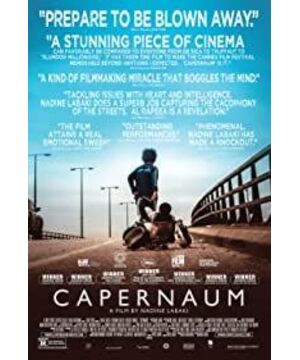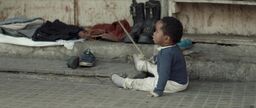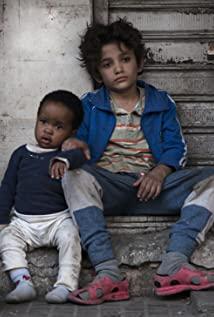After watching this movie, I feel very sad, the kind of sadness that I can't cry. The rhythm of the movie is not intense, and many scenes are like a bystander, just quietly narrating the passage of time, but there is still a feeling of watching "The Thief Family", depressed and nowhere to release. If love is a choice, poverty is never an excuse to hinder it. If love is a necessity, there is no reason to obliterate it.
Zane's family is of course poor, dirty slums, dilapidated rental houses; he can't turn over when he sleeps, like a black slave being secretly trafficked; teenage children must go to child labor, even drug trafficking; the only reason to go to school is You can take things home; girls are treated as objects of trade, and after menarche, they are treated as commodities to be assigned to others... There is no basic definition of home, only underage child labor and brides.
In the final bench, his parents were also given a chance to appeal.
"What right do you have to criticize me? Do you have a situation like mine? Have you experienced what I went through? If you were me, I would have hanged myself long ago. Imagine feeding a child sugar water because there is nothing else to feed. I would rather commit a thousand crimes to keep my children alive. They are my children and no one has the right to criticize me."
It is certainly difficult to completely change this situation. The serious confrontation between social classes and the wandering of the people at the bottom like ants, the lack of emotion and the accumulation of sins that have resulted from it, have shrouded the entire country in a dark cloud, and no one can be alone.
But is that a reason not to love? no!
Rahir, an Ethiopian refugee working in a restaurant, is a single mother. In addition to avoiding identity issues, she has to do her best to take care of her children, but under such circumstances, she still took in Zane.
No matter how the black intermediary who obtained the certificate tempted her, she refused to sell the child from beginning to end, and the child was the only bottom line she insisted on . Zane was also with her. For the first time, he felt a short-lived maternal love and a sense of belonging at home. For the first time, and once in only two times, he showed a smile that matched his age, a pure and happy smile.
For every child, poverty is not the most terrible, but a home without love is the most terrible. Each child is not the private property of the parents, each is an independent individual, just like the dialogue between Liu Xing and his mother Liu Mei in "Family with Children":
Mom: Hey, I really shouldn't have given birth to you ignorant.
Liu Xing: Who asked you to give birth? ? With my consent? ?
Now that we have brought our child into this world, it is necessary for us to take care of him. It's just that our love for children now tends to fall into two extremes: either overly indulgent or very hurtful. What they need most and what we should give unconditionally is a lifetime of knowledge.
Fortunately, even though he was ignored and hurt in the end, Zane still faced the whole gray life with his enthusiasm and kindness. In the end, there was still light, and we also saw his second smile from the heart.
Love is a choice, and poverty is never a reason not to love.
PS: Although the film discusses many real social problems: arranged marriage, population buying and selling, poverty at the bottom, etc., it is still too thin to limit the solution to all these problems to the factor of fewer births.
View more about Capernaum reviews










